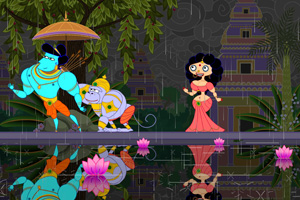SITA SINGS THE BLUES
(Sita Sings the Blues won the 2008 “Best Film Not Playing at a Theater Near You” award. After encountering nearly insurmountable problems with regards to clearing music rights, Nina Paley’s film has now found official distribution through FilmKaravan—in conjunction with Vista India Digital Media. You can buy it on DVD at Amazon, or visit the film’s official website to learn more.)
When it comes to the art and craft of animation, my taste buds are severely limited. As entertaining as animated shorts and features can be, the sad fact remains that my appreciation of this form almost always remains superficial. But this year has been different. On a larger scale, there was Wall-E, the first forty-five minutes of which unfolds like a work of art on par with 2001 or Solaris. On a smaller scale, Don Hertzfeldt’s I am so proud of you is, like his award-winning Everything Will Be OK, another mini-masterpiece of hilarious sadness. And don’t get me started on Israeli director Ari Folman’s Waltz With Bashir, an emotionally devastating, unforgettable fever dream of personal remembrance that continues to linger. Finally, here comes Nina Paley’s Sita Sings the Blues to sweep me all the way away.
In many ways, Sita Sings the Blues is more akin to Harmony Korine’s Mister Lonely than anything else I’ve seen in 2008. For while they appear dissimilar on the surface, they are both, at their core, ideas borne out of personal pain made into ultra-creative cinematic spectacles. Most people who get dumped turn their heartbreak into tears, junk food binging, or, God help the world, awful poetry or music. What did Paley do? How about combine the late-1920s music of jazz singer Annette Hanshaw with the classic Indian myth Ramayana placed alongside her own modern heartbreak to make a hilarious animated tale that doubles as a poignant statement on the universality and timelessness of female suffering?
Paley does so many things right with this film—so many things, period—that the more one thinks about it, the more impossible it seems. I must confess, reading the description, I was turned off by the prospect. Those divergent elements mixed together? It sounded like a clear case of filmmaker overload. Comparing your own breakup to a centuries old Indian epic? It doesn’t get more arrogant than that. And as if that wasn’t enough, tossing a Depression era jazz soundtrack into the mix? Um, thanks, but no thanks.
 But now that I’ve seen it, I have two things to say. First of all, to those of you who share my trepidation, I would like to assure you that you have nothing to fear. In fact, the only thing you need to worry about is missing out on something very special. Second of all, to Ms. Paley, I apologize for doubting your creativity and talent. When the smoke clears, I feel confident that I will be talking about your film for many years to come. Your unabashedly personal creative expression is dazzlingly delightful and wholly unique.
But now that I’ve seen it, I have two things to say. First of all, to those of you who share my trepidation, I would like to assure you that you have nothing to fear. In fact, the only thing you need to worry about is missing out on something very special. Second of all, to Ms. Paley, I apologize for doubting your creativity and talent. When the smoke clears, I feel confident that I will be talking about your film for many years to come. Your unabashedly personal creative expression is dazzlingly delightful and wholly unique.
While the film is smart, inventive, and impressively animated (a few different techniques are used, but I am the last person on the planet to dig into this aspect of the production), it distinguishes itself with its refreshing sense of humor. Somehow, Paley makes history and heartache feel like pure entertainment. From the outset, she acknowledges the audacity of comparing her own plight to that of Sita, the Hindu goddess whose love for her husband Rama was tested beyond measure. And she further removes any threat of pretension by having three Indonesian shadow puppets tell the Ramayana tale, as they bumble and fumble to remember exactly how it goes. Finally, interspersed within these narratives are interludes set to Hanshaw’s adorable songs, which act as chapter conclusions to keep viewers up-to-speed on where things stand.
Though Sita Sings the Blues is, first and foremost, a gleefully expressive work of entertainment, as the parallel stories of Sita and Nina expand and these women continue to suffer, one of the male narrators raises an interesting point, and the film attains a new gravity. Why does Sita put up with Rama’s jealousy and cruel shunning of her? It’s okay for a while, but at some point it begins to reek of self-abuse. The female narrator’s defense is that it’s a case of unconditional love and that unconditional love isn’t stupid, it’s important. Neither male narrator buys it. At the same time, in modern America, as Nina continues to whine and wallow in her own puddle of misery, the once comical, outlandish connection between these two women becomes serious. Here is a female in the 21st Century who is suffering from a similar problem. While both of them should know better, they remain clouded by love. Or is it something else, something less romantic and noble? While Paley doesn’t provide any answers, the mere audacity of her creative expression shows just how strong and defiant women can be, even if they waste too much time pining over silly, stubborn men.
— Michael Tully











